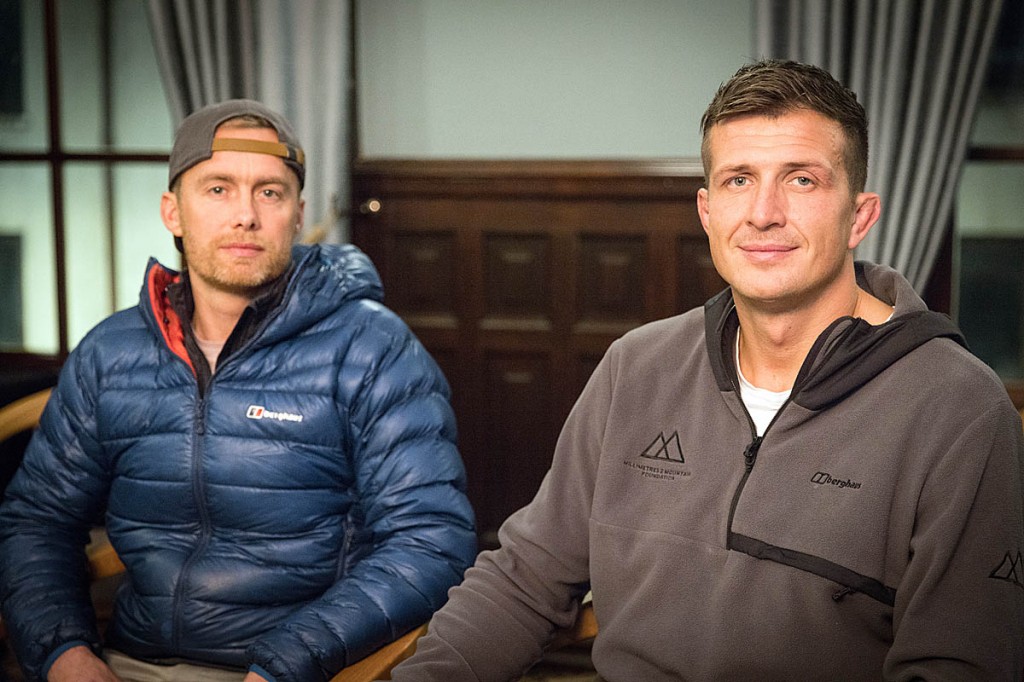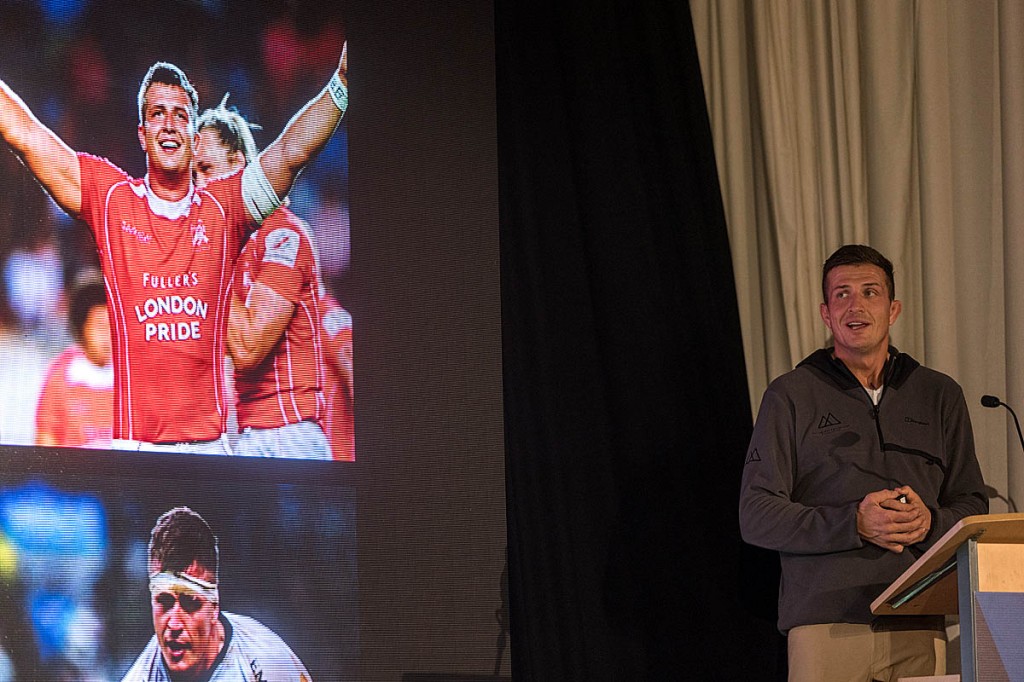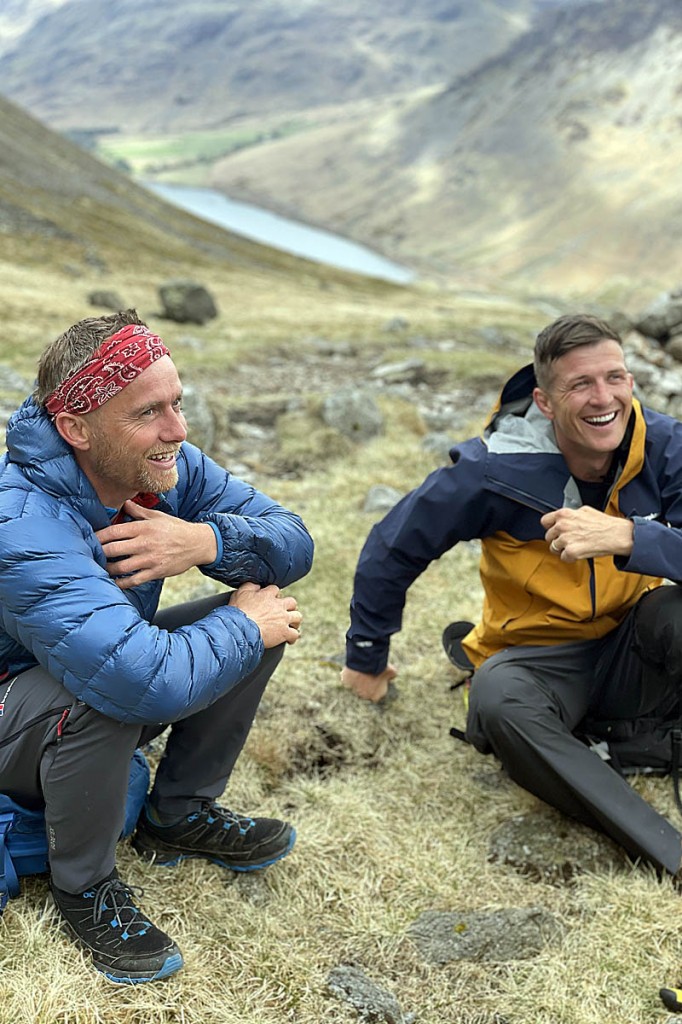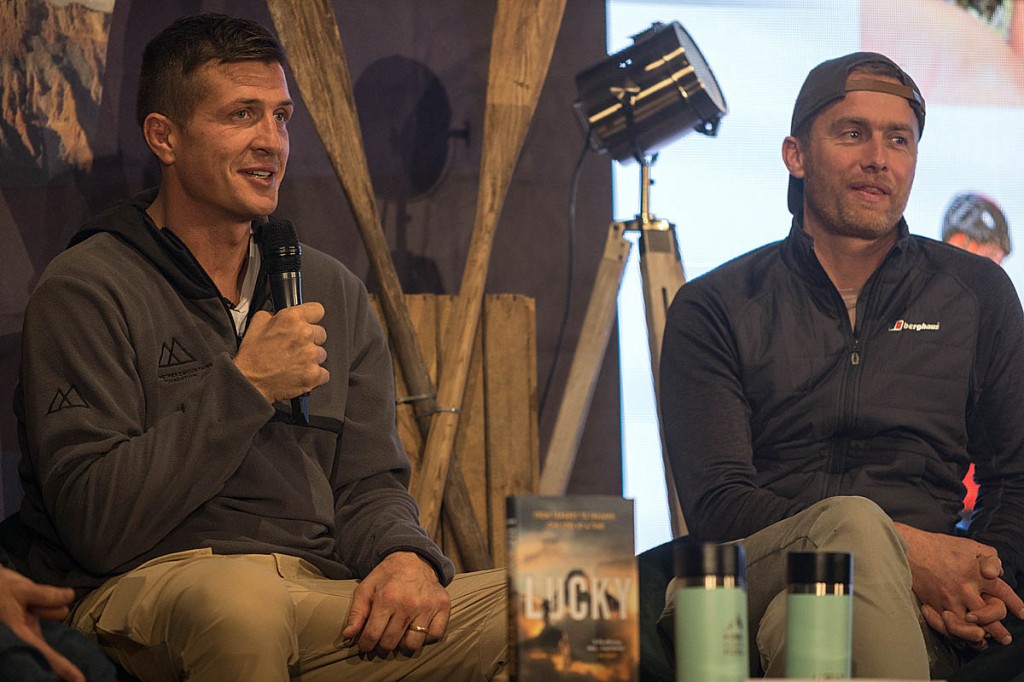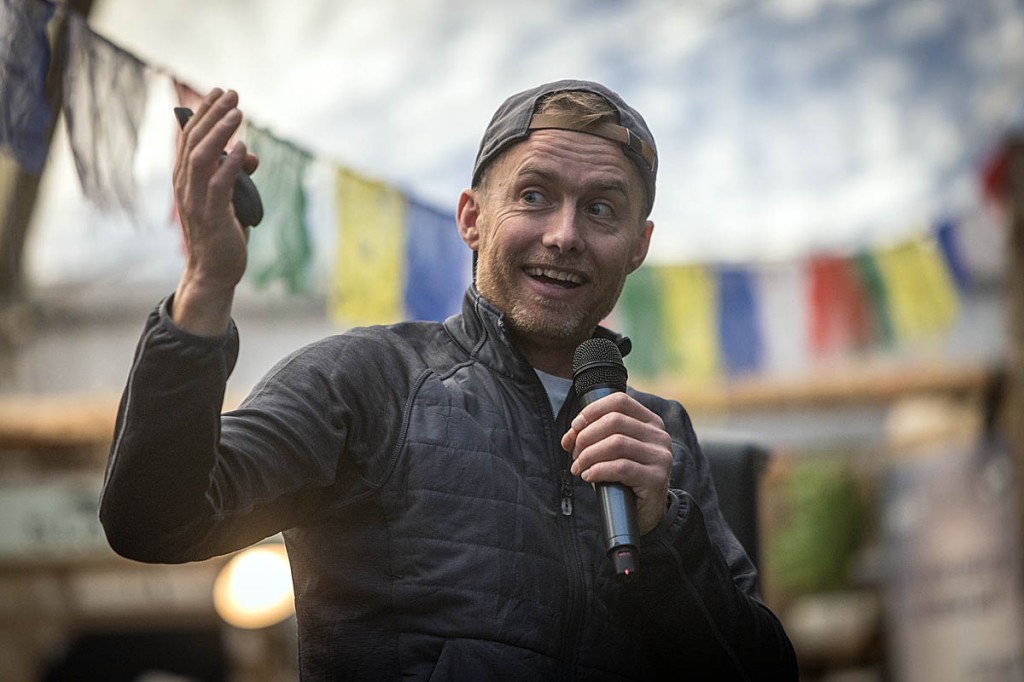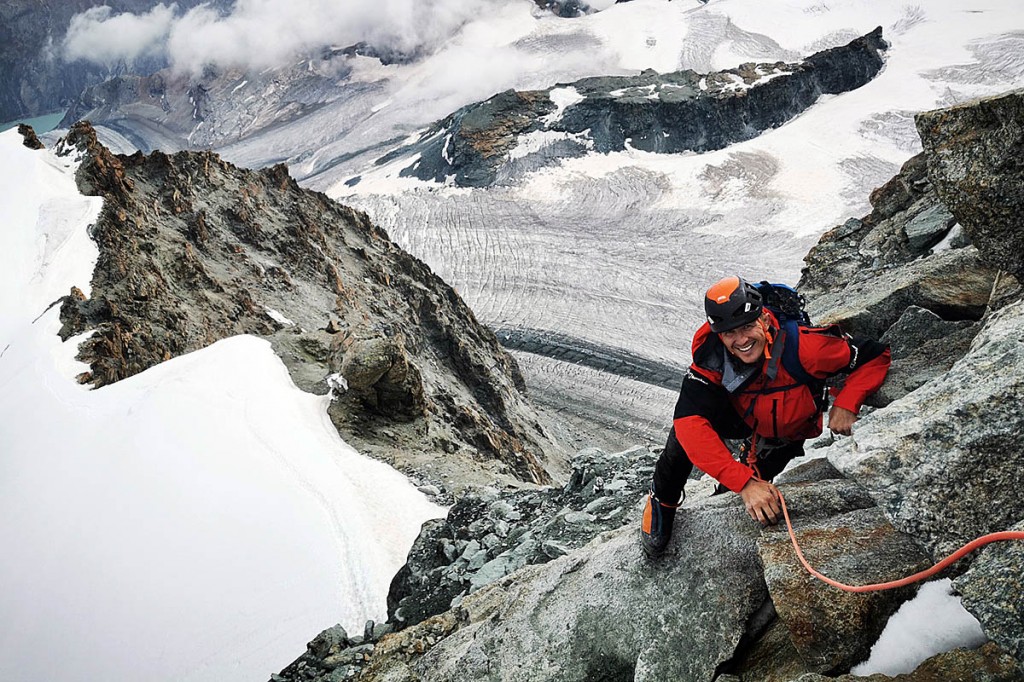Ed Jackson says he is a lucky man.
That may seem a strange statement from someone whose professional rugby career was abruptly cut short when he was paralysed from the shoulders down at the age of 28.
In 2017 he dived into the shallow end of a swimming pool and suffered serious spinal injuries, ending a 10-year career. Medics told him would probably never walk again.
A few days later in hospital he was able to twitch a toe. A year later he summited Snowdon and four years after his accident he was climbing alpine mountains.
I caught up with Jackson at the recent Kendal Mountain Festival, where he and mountaineer Leo Houlding hosted a screening of A Different Approach, detailing their exploits in the Swiss Alps, filmed by Stuart Kershaw.
His book is called Lucky. So, why ‘lucky’, I asked Jackson.
“It’s a mindset,” he said. “Actually I was surprised. The publishers came to me and said: ‘you do realise in the first 50 days of your blog you said the word lucky 36 times.
“I think it’s a survival technique at the start. If you don’t see it that way round, you’re going to beat yourself up because you’re in such a scary position. Your mind does that automatically; it reframes things because it has to as a survival mechanism, but then that carries on. Once you’ve had to do it for so long, I reframe everything now subconsciously, which is quite useful.”
Addressing Houlding, he said: “But you forget. When I played rugby for 10 years, you forget how lucky you are to be able to do what you do, until all of a sudden there’s a kid who gets to run up the tunnel with you. You see the look on their face and it takes you back to when you first started and it’s you [Houlding] were saying in Chamonix you spend a lot of time with professional climbers.
“I think you have to remember how lucky you are to have found climbing at a young age, you’ve found something you love, because most people don’t find something they love ever, or until a later date. I hope that by seeing how much I love it, it reminded you how lucky you are to have done it.”
The original intention of the alpine venture was an ascent of Mont Blanc, aided by Houlding and guide Adrian Nelhams, but unfavourable weather meant a change of plans. Instead, the four-man team climbed two 4,000m peaks, the Weissmies and Allalinhorn.
Kershaw’s film gives a good idea of the difficulties faced by Jackson, whose left side doesn’t function properly and whose right side has no sensation. He also has problems regulating his temperature and with bladder and bowel functions.
The climbs provided a challenge for the two mountaineers, too, with a big ‘wobbly man’ being belayed or short-roped up two challenging peaks.
Maybe it was luck, too, that Jackson approached outdoors brand Berghaus when he began his challenges. They adapted clothing and equipment for him, and their lead athlete Houlding, one of Britain’s top climbers, began a friendship that continues and led to Jackson’s discovery of what a man with disabilities can achieve in the outdoor world.
The company modified trousers to allow easier access to the bag collecting his fluids and also attached loops to enable him to lift his leg over obstacles.
I asked if Mont Blanc was still on his to-do list.
Jackson said: “I will do it at some point. It feels like I’ve we’ve skipped it. It has opened my eyes to challenging in more technical ways and I think Mont Blanc would be for the sake of just ticking a box.”
Houlding added: “I think Ed discovered climbing in that week. Climbing is not about getting to the top and I think up until that trip we did for Ed, climbing mountains was a goal-setting thing, giving yourself targets to train for and a rehabilitation thing, which is completely valid and cool, but when you discover what climbing is, a beautiful game, it isn’t about the summit; it’s about the journey and the process and the friendships and all that stuff. I think he got that.
“I don’t like busy mountains. I hate it when there’s loads of other people around, and Mont Blanc, the normal route, is pretty much the busiest thing in the Alps. I’ve never climbed Mont Blanc; I’d quite like to and I would be up for going back but we’d rather go and do something else.
“I would have happily climbed Mont Blanc with Ed. It does feel like unfinished business. At the start of that week, something that perhaps doesn’t come across and we didn’t say, is: it’s pretty full-on short roping a big lad. He falls over all the time, into high-consequence terrain as we call it, which means you die if it goes wrong. It’s actually pretty serious, because you’re not belaying; you’re not attached to the rock. You’re short roping above big precipices and he’s really wobbly. And he does go down pretty hard sometimes.
“There was only one little incident and, it’s pretty serious – our life was in each other’s hands.”
Jackson: “We touched on it. We said about, in the film, me putting all my trust in Leo, but he put his life on the line by having me on the back of him.
Houlding: “I didn’t tell you this, but Jess [Leo’s wife] was more worried about this trip than about any trips I’ve been on for years. There was a lot of uncertainty. There are big chunks on Mont Blanc where you could have pulled us both to our deaths quite easily.
Jackson: “High consequence.”
Houlding: “Yeah, high consequence. I introduced that term to him. By high consequence you mean, if you mess it up, you’re going to die.
Jackson: “After a while, he didn’t want to say the word death, so you’re just saying it differently.
“One of the big things about this trip is respecting the form of climbing and understanding how safe it is when you know what you’re doing and if you’re not reckless and I now understand why Leo’s still alive at 40. The stuff he’s done, it’s because he’s meticulous and he’s professional.”
“I respected the process and the art form and that’s what I really enjoyed about this trip. I didn’t know anything about it so my gut instinct is saying: ‘cliff face; dangerous’. But actually it’s not, it’s the icy snow slope down to the right where, if you lost your grip…
“Once you’re tied to the rock and you’ve got your harness on and the rope, even though it’s counterintuitive to me, you’re in the safest position. It was learning about that. It was interesting.”
Houlding: “One thing that’s not in the film: there’s a five-pitch rock group. I enjoyed that the most because that was properly technical rock-climbing. Same as that bit on the Allalinhorn. It was interesting. There were a couple of showstopping sections but generally you did really well on it.”
Jackson: “I’d be there, and I can’t lift this leg to there, which is like anyone else could do. So you guys were having to work out how to do it.”
Houlding: “Sometimes there would be an obstacle. He’s got pretty good at managing his disability on flat ground, on hills, on stairs, but all of a sudden its: how are we going to do this then? Try sitting down and shuffling backwards.
Jackson: “They were giving advice, saying why don’t you try this; why don’t you try that? Why don’t you stick your arm in there?
Houlding: “He needs another loop on his foot for climbing. The knee one works well, but sometimes you actually needed to grab your foot and put it somewhere.
Jackson: “On the technical climb, I felt secure, but there was still a lot of fear, that natural fear that’s in you with height. I haven’t spent much time in that sort of position, even before my accident, so instinctively your body is nervous. As time went on I was more and more reassured. I wouldn’t have done it if it wasn’t Leo and Ade [guide Adrian Nelham].
“That’s the other thing about climbing Mont Blanc. They put me in a position where I can do that with another guide but it’s kind of, I only want to do stuff I can do with Leo and Ade’s expertise, which is different things now, and working those things out as we go. But yes, it was scary, but exciting scary.
“And it was hard work as well. Up until this point it had just been about a slog, it has been high-altitude walking. Mera Peak, 6,500m was no joke physically, but it wasn’t challenging mentally – just how hard can you dig deep?
“But this was like puzzles. Once you work something out that you’ve been stuck on for a while and you get to the top of that pitch, it feels like summiting, and you get to do that. You get that reward over and over again on one mountain.”
In the film, Houlding tells Jackson that sometimes the giving of a gift is better than the receiving.
He said: “I do a lot of this stuff, and I love being in the mountains but those two routes that we did were, kind of, not a big deal for me, but being there with Ed: a, his challenges, but b, it’s so cool.
“You know, the mountains are for everyone and adventure is for everyone at different levels. For me personally, it has to be pretty gnarly and amped up to 11 for me to get that feeling. But you had that feeling and I got it too via him.
“I have to be at the end of the earth to get that buzz that you were getting, but because you were getting it, I was getting it too, because he was so psyched and it was blowing his mind. It’s infectious, you feel that vibe, so I really enjoyed the week, partly because of that and also because you walk that talk, that great talk you just did; it’s not hot air. It’s not as if he changes into a different character when he gets off stage and he’s corporate messaging. No, he’s never once complained that whole trip.
“I suffer from a bit of navel gazing, focusing on the negatives and what you don’t have. You don’t have to be like that. You can consciously choose to see the glass is half full and be grateful for what you have. I think that really rubs off on you.”
Before embarking on the alpine trip, the pair spent time making the ascent of Scafell Pike in the Lake District.
Houlding said: “I wouldn’t have gone with him if we didn’t have a good relationship. Part of the reason we went up Scafell Pike was to see how he performed but I don’t like going on adventures with people I don’t like and we got on really well. We were like old mates even though we’d only known each other for a week or so.
Jackson: “The trust, danger, high consequence thing does bond people pretty quickly – even more in this environment because the consequence is death. But even rugby teams bond quickly because they have to put their body on the line for each other and soldiers bond quickly because you’re in those high-consequence situations. But we get on anyway. We like the same stuff. But then going up there and having to put our trust in each other…
Houlding: “A few days on a rope is like a few months hanging out.
“We were in Chamonix and we’d get a lift up to the start of the climb and it’s not comparable to a remote expedition so it was a totally different thing. It wasn’t really Ed’s scene and it wasn’t my scene, we were a team. Ade was a very crucial part of it, Adrian Nelhams, he lives here in Kendal, he’s a top guide and he was probably the most important, because he chose the objectives.
Jackson: “The film’s called A Different Approach and the different thing about it is, there’s a person with quadriplegia on a mountain but it was a team. Adrian was probably the leader, wasn’t he? Then Leo, and I’m being dragged along. So in terms of planning an expedition it was very similar to what he’s done, but the narrative coming out of it is different.
“There’s a misconception [about quadriplegia]. Quadriplegia just means all four limbs are affected. Paraplegic, two limbs are affected. It doesn’t necessarily say how affected they are. So a complete quadriplegic is someone who will have no movement or sensation.
“I’m an incomplete quadriplegic. The correct term is still quadriplegic because all four limbs are affected.”
I said Jackson’s situation is a reminder that anyone can become disabled. He has demonstrated that a person with fairly severe disabilities to start with can enjoy the outdoors. What would he say to people who might be in that position?
“Your disability doesn’t define you. It’s just something that’s part of you, like having brown hair or white skin.
“I’ve got a disability but that’s because it’s medically defined as a disability, but someone who has depression would be suffering worse than me in a different way, but it’s not defined as a disability. So I just don’t move around very well and I have other issues. That doesn’t necessarily mean that has to stop your life. And in fact it can enhance your life if you see it that way. It’s just a mindset. And I think, the general public’s attitude – maybe in the outdoor space, we’re not used to being around people with disabilities. I’d like to encourage more people to get out there and try things and hopefully if we can adapt things we can do that. Just, don’t underestimate people with disabilities. They might not be able to do all the things you can do but actually a lot of them, because of what they’ve been through, will be stronger than you would expect.
“I would probably be guilty of this before, but you kind of look after people with disabilities. I’ve just been out to Tokyo and covered all the wheelchair rugby. They’re some of the hardest blokes I’ve ever seen and it’s just a part of who someone is. You don’t have to look after people with disabilities necessarily. It doesn’t really change the person, in fact often it makes them stronger, I think.”
Jackson founded the Millimetres 2 Mountains charity to help people who are facing mental health challenges as a result of encountering adversity in their lives. It uses exploration, adventure and the great outdoors to inspire and support individuals in redefining their limitations and taking steps towards a brighter future.
In his presentation he detailed a man whose post-traumatic stress disorder, initially so severe he could barely speak, was aided back towards normality by joining the charity’s activities. It’s a different kind of disability from his, he said.
“The man with PTSD was way worse. For me, it’s obvious – people can see me limping around but people are suffering way worse than me. Some of the work we do with the charity, we’re not trying to fix people physically.
“We’ve got people who have suffered spinal injuries, but a happy person in a wheelchair is way better than an unhappy person walking around. It’s just getting yourself back to a place of positive mindset and having some purpose back in your life and that doesn’t necessarily mean – for me, the only way that would happen was if I walked again. But actually that’s not true. I’ve met loads of complete quadriplegics who are happy. It’s just finding some purpose in your life again. That’s kind of what we try to do with the charity. It’s opening their eyes up to new possibilities and helping them get to those positions.
“We run four charity trips a year. We’re going to Nepal twice next year. I’m going to try to climb a mountain called Himlung Himal in March, which is 7,000m but again, it’s a high-altitude walk but very high altitude. That will be the highest spinal cord injury ever.
“Outside of that, Leo’s been chucking some ideas around.”
Houlding: “I think we should get on a proper wall, a vertical camping trip. There will have to be some warming up, figure out how we can get you climbing ropes, how to jumar.
“He wouldn’t be lead climbing, he’d be jumaring, same as the Amerindian boys did [during his expedition to climb Mount Roraima in South America] and we’ll have to adapt a system for you, something that works. I’m sure we could do it. Camping on a cliff is the coolest thing ever. Spend a few days. It’s really fun, really cool, I think you’d dig it.
“Climbing up the ropes will be challenging. It’s a real physical challenge, but I’m sure you could do it if we can come up with a system, which I’m sure we could.
Jackson: “It’s mad even having conversations like this. If we’d thought a year ago or even a few months ago that we’d even contemplate things like that but now I’ve just learnt to say yes, and do what he says. What could possibly go wrong?
Houlding: “I’m definitely getting a kick out of sharing the adventure with people who haven’t been on that same path. I’m 41 and I’ve totally noticed, I still get a kick out of doing my own super hard stuff and pushing the envelope, but more and more I’m getting a kick out of enabling other people to do stuff.
“It’s not rocket science, but there are processes. You can be stood in these mind-blowing situations that are really scary, really exposed. I’m so casual in that environment that it sort of rubs off a little bit and you can get people to do way more hardcore stuff than you can possibly imagine. You should see some of the stuff my kids do. It’s because I’m their dad and I normalise it for them. I think I’ve done the same thing with you. We’ve gone into these exceptional environments but we’ve normalised it.
Jackson: “It feels comfortable, then you look back and think: what did you just make me do? It felt absolutely fine.
“Who has the opportunity to climb with people like Leo? Other people of that echelon are off with their other expert climbers on the other side of the world. Unless you’re paying them huge amounts of money, no-one’s actually saying, let’s share this.”
Houlding: “It’s the sharing. It’s not that hard for me to share those skills that are life-changing for you.
“This is for everyone. We can all do this. The Roraima thing was similar, getting the local guys up there. It made my life a lot more difficult, logistically as an expedition leader, but it was the best part of the trip. It was their faces on the top. They didn’t know they could do that.
Jackson: “It’s important for people to see people like me and the indigenous people in those positions because it gives people hope. It might not be doing the same thing, but they can do things outside their comfort zones. They can start to think outwardly and dream bigger.”
- Stuart Kershaw’s film charts the alpine climbs
More immediately, Jackson has announced he’ll be tackling his 12 Peaks of Christmas charity challenge over the festive period, to raise cash for his Millimetres 2 Mountains Foundation and War Child’s Afghanistan emergency appeal.
